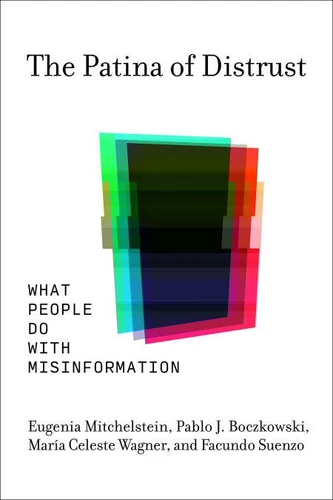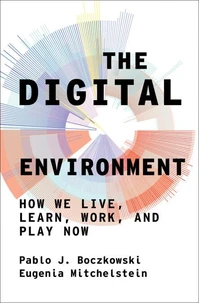Nouveauté
The Patina of Distrust. What People Do with Misinformation
Par : , , ,Formats :
Disponible dans votre compte client Decitre ou Furet du Nord dès validation de votre commande. Le format ePub protégé est :
- Compatible avec une lecture sur My Vivlio (smartphone, tablette, ordinateur)
- Compatible avec une lecture sur liseuses Vivlio
- Pour les liseuses autres que Vivlio, vous devez utiliser le logiciel Adobe Digital Edition. Non compatible avec la lecture sur les liseuses Kindle, Remarkable et Sony
- Non compatible avec un achat hors France métropolitaine
 , qui est-ce ?
, qui est-ce ?Notre partenaire de plateforme de lecture numérique où vous retrouverez l'ensemble de vos ebooks gratuitement
Pour en savoir plus sur nos ebooks, consultez notre aide en ligne ici
- Nombre de pages300
- FormatePub
- ISBN978-0-262-38112-3
- EAN9780262381123
- Date de parution28/10/2025
- Protection num.Adobe DRM
- Taille7 Mo
- Infos supplémentairesepub
- ÉditeurThe MIT Press
Résumé
The dynamics of news reception during the 2019 Argentine elections, and how distrust of the media can protect audiences from both misinformation and attempts to correct it. The year 2016 marked a profound turning point in global politics. In June, the United Kingdom voted in favor of Brexit, choosing to leave the European Union. Just five months later, the United States elected Donald Trump as its president.
In the wake of these momentous events, a prevailing narrative emerged, which focused on the role of misinformation in reshaping political landscapes. However, a critical aspect of this phenomenon remained unexplored-the dynamics of reception. In The Patina of Distrust, Eugenia Mitchelstein, Pablo Boczkowski, María Celeste Wagner, and Facundo Suenzo dive deep into this overlooked facet by zeroing in on the reception of misinformation.
Central to the book is the development of the concept of "patina of distrust." Much like the protective layer that accumulates over time on artworks, this societal patina serves as a buffer, shielding audiences to some extent from the harmful effects of misinformation and the attempts to rectify it. This book offers a historically grounded mixed methods study of news reception in Argentina's 2019 presidential election, drawing from interviews, survey data, and experiments.
The authors also include a coda that addresses the pandemic and the election of current Argentine president Javier Milei in 2023, bringing the analysis up to date with the current right-wing populist moment.
In the wake of these momentous events, a prevailing narrative emerged, which focused on the role of misinformation in reshaping political landscapes. However, a critical aspect of this phenomenon remained unexplored-the dynamics of reception. In The Patina of Distrust, Eugenia Mitchelstein, Pablo Boczkowski, María Celeste Wagner, and Facundo Suenzo dive deep into this overlooked facet by zeroing in on the reception of misinformation.
Central to the book is the development of the concept of "patina of distrust." Much like the protective layer that accumulates over time on artworks, this societal patina serves as a buffer, shielding audiences to some extent from the harmful effects of misinformation and the attempts to rectify it. This book offers a historically grounded mixed methods study of news reception in Argentina's 2019 presidential election, drawing from interviews, survey data, and experiments.
The authors also include a coda that addresses the pandemic and the election of current Argentine president Javier Milei in 2023, bringing the analysis up to date with the current right-wing populist moment.
The dynamics of news reception during the 2019 Argentine elections, and how distrust of the media can protect audiences from both misinformation and attempts to correct it. The year 2016 marked a profound turning point in global politics. In June, the United Kingdom voted in favor of Brexit, choosing to leave the European Union. Just five months later, the United States elected Donald Trump as its president.
In the wake of these momentous events, a prevailing narrative emerged, which focused on the role of misinformation in reshaping political landscapes. However, a critical aspect of this phenomenon remained unexplored-the dynamics of reception. In The Patina of Distrust, Eugenia Mitchelstein, Pablo Boczkowski, María Celeste Wagner, and Facundo Suenzo dive deep into this overlooked facet by zeroing in on the reception of misinformation.
Central to the book is the development of the concept of "patina of distrust." Much like the protective layer that accumulates over time on artworks, this societal patina serves as a buffer, shielding audiences to some extent from the harmful effects of misinformation and the attempts to rectify it. This book offers a historically grounded mixed methods study of news reception in Argentina's 2019 presidential election, drawing from interviews, survey data, and experiments.
The authors also include a coda that addresses the pandemic and the election of current Argentine president Javier Milei in 2023, bringing the analysis up to date with the current right-wing populist moment.
In the wake of these momentous events, a prevailing narrative emerged, which focused on the role of misinformation in reshaping political landscapes. However, a critical aspect of this phenomenon remained unexplored-the dynamics of reception. In The Patina of Distrust, Eugenia Mitchelstein, Pablo Boczkowski, María Celeste Wagner, and Facundo Suenzo dive deep into this overlooked facet by zeroing in on the reception of misinformation.
Central to the book is the development of the concept of "patina of distrust." Much like the protective layer that accumulates over time on artworks, this societal patina serves as a buffer, shielding audiences to some extent from the harmful effects of misinformation and the attempts to rectify it. This book offers a historically grounded mixed methods study of news reception in Argentina's 2019 presidential election, drawing from interviews, survey data, and experiments.
The authors also include a coda that addresses the pandemic and the election of current Argentine president Javier Milei in 2023, bringing the analysis up to date with the current right-wing populist moment.




